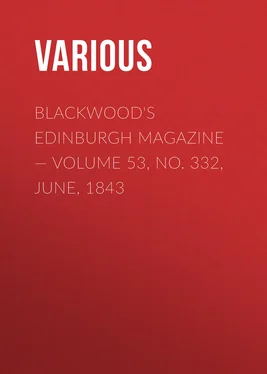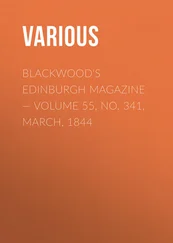Various - Blackwoods Edinburgh Magazine – Volume 53, No. 332, June, 1843
Здесь есть возможность читать онлайн «Various - Blackwoods Edinburgh Magazine – Volume 53, No. 332, June, 1843» — ознакомительный отрывок электронной книги совершенно бесплатно, а после прочтения отрывка купить полную версию. В некоторых случаях можно слушать аудио, скачать через торрент в формате fb2 и присутствует краткое содержание. Жанр: foreign_antique, periodic, foreign_edu, на английском языке. Описание произведения, (предисловие) а так же отзывы посетителей доступны на портале библиотеки ЛибКат.
- Название:Blackwoods Edinburgh Magazine – Volume 53, No. 332, June, 1843
- Автор:
- Жанр:
- Год:неизвестен
- ISBN:нет данных
- Рейтинг книги:4 / 5. Голосов: 1
-
Избранное:Добавить в избранное
- Отзывы:
-
Ваша оценка:
- 80
- 1
- 2
- 3
- 4
- 5
Blackwoods Edinburgh Magazine – Volume 53, No. 332, June, 1843: краткое содержание, описание и аннотация
Предлагаем к чтению аннотацию, описание, краткое содержание или предисловие (зависит от того, что написал сам автор книги «Blackwoods Edinburgh Magazine – Volume 53, No. 332, June, 1843»). Если вы не нашли необходимую информацию о книге — напишите в комментариях, мы постараемся отыскать её.
Blackwoods Edinburgh Magazine – Volume 53, No. 332, June, 1843 — читать онлайн ознакомительный отрывок
Ниже представлен текст книги, разбитый по страницам. Система сохранения места последней прочитанной страницы, позволяет с удобством читать онлайн бесплатно книгу «Blackwoods Edinburgh Magazine – Volume 53, No. 332, June, 1843», без необходимости каждый раз заново искать на чём Вы остановились. Поставьте закладку, и сможете в любой момент перейти на страницу, на которой закончили чтение.
Интервал:
Закладка:
As I looked round the wretched chamber in which this bold, arrogant, and busy spirit was evidently about to breathe its last, Pope's lines on the most splendid roué of his day involuntarily and painfully shot across my recollection:—
"In the worst inn's worst room, with mat half hung,
The walls of plaster, and the floor of dung;
The George and Garter dangling from the bed,
Where tawdry yellow strove with dirty red,
Great Villiers lies; alas, how changed from him
The glass of fashion!"
I say no more of those scenes; a few days, only enough to collect the branches of the family round the bed, terminated every thing. Grief, they say, cannot exist where there is no love, but I was not inclined, just then, to draw subtle distinctions. I was grieved; and paid the last duties, without blame to myself, or, I hope, irreverence in the sight of others. The funeral was stately, and all was over.
Matters now took a new shape at the castle. My brother returned, to find himself its possessor. His journey had been equally unproductive with my unfortunate father's. By dint of bribing the postilions, he had even overpassed the fugitives on the Dover road. But, as he stopped to dine in Canterbury, where he had prepared a posse of constables for their reception, he had, unluckily, been accosted by an old London acquaintance, who had accidentally fixed his quarters there for a day or two, "seeking whom he might devour." The dinner was followed by a carouse, the carouse by a "quiet game," or games, which lasted till the next day; and when my brother rose, with the glow of a superb sunset giving him the first intimation that he was among the living, he made the discovery that he was stripped of the last shilling of five hundred pounds, and that the Frenchman and his prize had quietly changed horses at the same hotel half a dozen hours before.
The young forget quickly, but they feel keenly. The event which I had just witnessed threw a shade over me, which, in the want of any vigorous occupation, began to affect my health. I abjured the sports of the field, for which, indeed, I had never felt much liking. I rambled through the woods in a kind of dreamy idleness of mind, which took but little note of any thing, time included. As mendicants sell tapes and matches to escape the imputation of mendicancy, I carried a pencil and portfolio, and seemed to be sketching venerable oaks and patches of the picturesque, while my mind was wandering from Line to Pole. But in this earth no one can be singular with impunity. The gentlemen were "convinced" that my meditations were heavy with unpaid college bills; and the ladies, from high to low, from "Tilburina, mad in white satin," to her "confidant, mad in white linen," were all of opinion that some one among their peerless selves had destroyed the "five wits of young Mr Marston." I could have fallen on them with a two-handed sword; but as the massacre of the sex was not then in my power, I had only to escape.
There were higher matters to move me. Clouds were gathering on the world; the times were fitful; the air was thick with rumours from abroad; the sleep of the Continent was breaking up, and Europe lay in the anxious and strange expectancy in which some great city might see the signs of a coming earthquake, without the power of ascertaining at what moment, or from what quarter, its foundations were to be flung up in sight of the sun.—We were then in the first stage of the French Revolution!
I resolved to linger and be libelled no more; and being ushered, by appointment, into the library—for the new master was already all etiquette—I promptly stated my wishes, and demanded my portion, to try my fortune in the world.
Our conference, if it had but little of the graces of diplomacy, had much more than its usual decision. It was abrupt and unhesitating. My demand had evidently taken his "lordship" by surprise. He started from the magisterial chair, in which he was yet to awe so many successions of rustic functionaries, and with a flushed cheek asked "Whether I was lunatic, or supposed him to be so?"
"Neither the one nor the other," was my answer. "But, to waste life here is out of the question. I demand the means of entering a profession."
"Are you aware, sir, that our interest is lost since the last change of ministers? that my estate is loaded with encumbrances? that every profession is overstocked? and what can you do in the crowd?"
"What others have done—what I should do in a crowd in the streets—push some aside, get before others; if made way for, be civil; if resisted, trample; it has been the history of thousands, why not mine?"
The doctrine was as new to this son of indulgence, as if I had propounded the philosopher's stone. But his courage was exhausted by a controversy perhaps longer than he had ever ventured on before. He walked to the glass, adjusted his raven ringlets, and having refreshed his spirits with the contemplation, enquired, with a smile which made the nearest possible approach to a sneer, whether I had any thing more to say?
I had more, and of the kind that least suited his feelings. I demanded "my property."
The effect of those two words was electrical. The apathy of the exquisite was at an end, and in a voice of the most indignant displeasure, he rapidly demanded whether I expected money to fall from the moon? whether I was not aware of the expense of keeping up the castle? whether I supposed that my mother's jointure and my sisters' portions could ever be paid without dipping the rent-roll deeper still? and, after various and bitter expostulation, "What right had I to suppose that I was worth the smallest coin of the realm, except by his bounty?"
One query answered them all. "My lord, is it not true that I am entitled to five thousand pounds?"
"Five thousand –?" what word was to fill up the interval I can only guess. But the first lesson which a man learns at the clubs is, to control his temper when its display is not likely to be attended with effect. He saw that I stood his gaze with but few symptoms of giving way, and he changed his tactics with an adroitness that did honour to his training. Approaching me, he held out his hand. "Charles, why should we quarrel about trifles? I was really not acquainted with the circumstance to which you allude, but I shall look into it without delay. Pray, can you tell me the when, the where, the how?"
"Your questions may be easily answered. The when was at the death of our uncle, the where was in his will, and the how —in any way your lordship pleases." The truce was now made; he begged of me, "as I valued his feelings," to drop the formality of his title, to regard him simply as a brother, and to rely on his wish to forward every object that might gratify my inclination.
Our conference broke up. He galloped to a neighbouring horse-race. I went to take a solitary ramble through the Park.
The hour and the scene were what the poet pronounces "fit to cure all sadness but despair." Noble old trees, the "roof star-proof" overhead, the cool velvet grass under the feet—glimpses of sunlight striking through the trunks—the freshened air coming in gusts across the lake, like new life, bathing my burning forehead and feverish hands—the whole unrivalled sweetness of the English landscape softened and subdued me. Those effects are so common, that I can claim no credit for their operation on my mind; and, before I had gone far, I was on the point of returning, if not to recant, at least to palliate the harshness of my appeal to fraternal justice.
But, by this time I had reached a rising ground which commanded a large extent of the surrounding country. The evening was one of those magnificent closes of the year, which, like a final scene in a theatre, seems intended to comprehend all the beauties and brilliancies of the past. The western sky was a blaze of all colours, and all pouring over the succession of forest, cultured field, and mountain top, which make the English view, if not the most sublime, the most touching of the earth!
Читать дальшеИнтервал:
Закладка:
Похожие книги на «Blackwoods Edinburgh Magazine – Volume 53, No. 332, June, 1843»
Представляем Вашему вниманию похожие книги на «Blackwoods Edinburgh Magazine – Volume 53, No. 332, June, 1843» списком для выбора. Мы отобрали схожую по названию и смыслу литературу в надежде предоставить читателям больше вариантов отыскать новые, интересные, ещё непрочитанные произведения.
Обсуждение, отзывы о книге «Blackwoods Edinburgh Magazine – Volume 53, No. 332, June, 1843» и просто собственные мнения читателей. Оставьте ваши комментарии, напишите, что Вы думаете о произведении, его смысле или главных героях. Укажите что конкретно понравилось, а что нет, и почему Вы так считаете.












